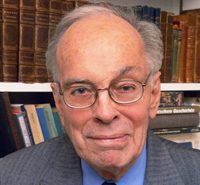Genscher and Genscherism

Robert Gerald Livingston
Dr. Robert Gerald Livingston is a Senior Visiting Research Fellow at the German Historical Institute in Washington, DC. He was the founding director of AICGS from 1983 to 1994.
The career and success of Hans-Dietrich Genscher, who died at age 89 on March 30, illustrate the strength of continuity in office. Such continuity has long been a feature of German political life: Konrad Adenauer headed the Federal Republic’s government for fourteen years, Walter Ulbricht the German Democratic Republic’s for seventeen; and Angela Merkel, chancellor of now united Germany, has been in office already for eleven years and looks to be staying there for quite a few more.
Genscher was a political activist from age nineteen on, first in East Germany’s Liberal Democratic Party (LPDP) until his move from his native and beloved Halle to Bremen in West Germany in 1952, where he started his Free Democratic Party (FDP) career. By 1964 he was FDP National Secretary, by 1969 FDP Chairman, a post he retained until 1994, and Honorary FDP Chairman until his death. He was the only East German at the top of German politics until Merkel came along.
Together with Otto Count Lambsdorff (1926 – 2009), Genscher gave the pro-business, libertarian FDP a political dynamic that carried it into the twenty-first century. (But has in recent years drastically slackened. Since 2013, the FDP is no longer represented in the Bundestag.)
Genscher spent twenty-three years in the federal cabinet, as his country’s longest-serving Minister of the Interior from 1969 to 1974 and, except from the Soviet Union’s Andrei Gromyko, as the world’s longest-serving Minister of Foreign Affairs (from 1974 to 1992).
For the first fifteen years, his party was in coalition with the Social Democrats (SPD); it later switched to a coalition with Helmut Kohl’s Christian Democrats (CDU).
With the 1974 resignation of the SPD chancellor Willy Brandt, Genscher assumed a decisive role in the Eastern Policy (Ostpolitik) of improving relations with the Soviet Union and countries like Poland and Hungary that belonged to the Moscow-run Warsaw Pact. His influence in Ostpolitik rivaled that of Egon Bahr, Brandt’s close collaborator, who was also of East German origin. He played a key role in the 1976 Helsinki Conference outcomes which reduced East-West tensions in Europe.
In 1982, Genscher led his party to desert its coalition with the SPD, which earned him venom from the Social Democratic chancellor, Helmut Schmidt, and to form a joint government with the CDU and its Bavarian partner, the CSU. Genscher remained foreign minister and became vice chancellor. His influence grew as he pursued his efforts to improve German ties with the Soviet Union and its Warsaw Pact allies while maintaining his country’s long-standing close relationship with the United States. It might be said that he was emulating Chancellor Bismarck’s policies of the 1880s and early 1890s—friendly ties with both East and West.
His efforts started to pay off in a big way when Mikhail Gorbachev came to power in Moscow in the mid-1980s. The climax of his career, of course, came in 1989-1990, when he, the Russian foreign minister Eduard Shevardnadze, and the American secretary of state James Baker played decisive roles in negotiating an end to German division—without military moves or even much political tension.
This historic accomplishment should not, however, disguise the fact that within the Reagan administration there existed a good deal of mistrust of Genscher. In part this resulted from his opposition in the mid-1980s to the deployment of new American nuclear weapons in Germany and his reluctance to treat communist countries in Europe as implacably hostile to the West. The mistrust was not shared by George Shultz, Reagan’s secretary of state, who worked well with Genscher.
Thanks to the efforts of Brandt, Schmidt, Genscher, and Kohl, Germany is in the safest and best position in its history as a united country, surrounded on every side by allies and friends.
Genscher’s vision is embodied in Germany’s foreign policy orientation today: NATO alliance and European Union loyalty as the firm operational basis of policy, an openness to negotiating and dealing with Russia on a broad range of issues, but resistance to Putin’s current aggressiveness toward Ukraine and eventually toward the Baltic countries.
Hans-Dietrich Genscher’s popularity among Germans has long been the highest of any top politician. Given his accomplishments—small wonder.
Dr. Robert Gerald Livingston is a Senior Visiting Research Fellow at the German Historical Institute in Washington, DC. He was the founding director of AGI from 1983 to 1994.








